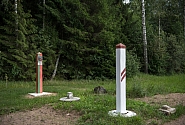
On Friday, 21 January, MPs from Latvia, Estonia, and Lithuania will join for a meeting of the Security and Defence Committee of the Baltic Assembly (BA) to discuss the challenges in addressing security issues on the European Union's (EU) eastern border and the cooperation of the Baltic States in combatting organised crime.
"The situation at the EU's external border and the hybrid attacks on Latvia, Lithuania, and Poland carried out by Alexander Lukashenko's regime are among the most pressing security issues. It is clear that there is no quick and easy solution to the problems caused by the Lukashenko regime in the border areas, but the Baltic States must work together in search of a way to guarantee security and stability in the region," said Jānis Vucāns, President of the BA and Head of the Latvian delegation to the organisation.
The Baltic MPs will also assess the situation in combatting organised crime, as well as discuss strengthening cooperation and joint actions in the fight against criminal networks, human trafficking, illegal drugs, illicit goods, and financial fraud.
As emphasised by Vucāns, the fight against organised crime is one of the priorities of the BA Security and Defence Committee during the Latvian Presidency.
Cooperation on external border maintenance and control will also be on the agenda, as well as the development of a concept for a comprehensive security model for crisis preparedness coordination in the Baltic States.
The meeting will be opened by the President of the BA Jānis Vucāns and moderated by Atis Lejiņš, Chair of the BA Security and Defence Committee.
Information about the BA:
On 1 January 2022 Latvia assumed the presidency of the Baltic Assembly.
The Baltic Assembly is an inter-parliamentary cooperation organisation of Latvia, Estonia and Lithuania established on 8 November 1991. The Baltic Assembly consists of national delegations—12 to 16 members from each country’s parliament. The Baltic Assembly is a coordinating and consultative organisation, which has a right to express its opinion to the national parliaments and governments of the Baltic States, as well as the Baltic Council of Ministers, in the form of resolutions, decisions, declarations, and recommendations; it also has a right to request the above-mentioned bodies to provide information on cross-border issues that are high on the Baltic Assembly’s agenda.
Saeima Press Service







